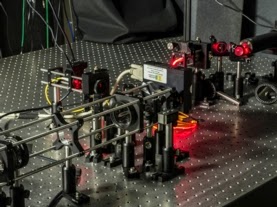A novel way of measuring a photon’s location allows physicists to measure its momentum, too — a feat once thought impossible.
Quantum mechanics imposes a limit on what we can know about subatomic particles. If physicists measure a particle’s position, they cannot also measure its momentum, so the theory goes. But a new experiment has managed to circumvent this rule—the so-called uncertainty principle—by ascertaining just a little bit about a particle’s position, thus retaining the ability to measure its momentum, too.
The uncertainty principle, formulated by Werner Heisenberg in 1927, is a consequence of the fuzziness of the universe at microscopic scales. Quantum mechanics revealed that particles are not just tiny marbles that act like ordinary objects we can see and touch. Instead of being in a particular place at a particular time, particles actually exist in a haze of probability. Their chances of being in any given state are described by an equation called the quantum wavefunction. Any measurement of a particle “collapses” its wavefunction, in effect forcing it to choose a value for the measured characteristic and eliminating the possibility of knowing anything about its related properties.
A very GOOD video explanation of Quantum Mechanics at the link, an episode of "Instant Egghead." I promise your hat will still fit after viewing it.
Scientific American:
Particle Measurement Sidesteps the Uncertainty Principle, Clara Moskowitz

Comments